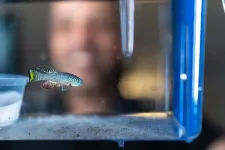(Press-News.org) Peer-reviewed – Observational Study - People
An important new study has advanced how heart failure is detected in women – meaning more female patients can be diagnosed and at an earlier stage.
Researchers led by teams from the Universities of East Anglia (UEA), Sheffield and Leeds, have been able to fine-tune how magnetic resonance imaging (MRI) is used to detect heart failure in women’s hearts, making it more accurate.
Lead author Dr Pankaj Garg, of the University of East Anglia’s Norwich Medical School and a consultant cardiologist at the Norfolk and Norwich University Hospital, said: “By refining the method for women specifically, we were able to diagnose 16.5pc more females with heart failure.
“This could have huge impact in the NHS, which diagnoses around 200,0001 patients with heart failure each year.
“This improved method will increase early detection, meaning more women can get life-saving treatment sooner."
In 2022, UEA and the University of Sheffield published research which showed how using MRI scans could be used to detect heart failure and which led to this technique being widely employed by medics.
When a heart starts to fail, it is unable to pump blood out effectively, and so the pressure in the heart rises.
Co-author Dr Gareth Matthews, of the University of East Anglia’s Norwich Medical School, said: “Currently one of the best ways of diagnosing heart failure is to measure pressures inside the heart with a tube called a catheter.
“While this is very accurate, it is an invasive procedure, and therefore carries risks for patients, which limits its use.
“For this reason, doctors tend to use echocardiograms, which are based on ultrasound, to assess heart function, but this is inaccurate in up to 50 per cent of cases. Using MRI, we can get much more accurate images of how the heart is working.”
The team was able to create an equation which allowed them to non-invasively derive the pressure in the heart using an MRI scanner.
However, previous use of this method wasn’t as accurate as the researchers would have liked in diagnosing heart failure in women, especially in early or borderline disease.
Co-author Professor Andy Swift, of the University of Sheffield’s School of Medicine and Population Health, said: “Women’s hearts are biologically different to men’s.
“Our work suggests that in heart failure women's hearts may respond differently in response to increases in pressure.”
Heart failure can be classed differently, depending on the amount of blood squeezed out of the main chamber of the heart with every beat, known as the heart’s ejection fraction.
Women suffer disproportionately from a type of heart failure where the pumping function of the heart is preserved but the ability of the heart to relax and fill with blood is impaired.
Echocardiography really struggles to diagnose this type of heart failure. The improvements in diagnosis from this new work will enable more of this particular cohort to be diagnosed more accurately and hopefully drive better treatments.
Co-author Dr Peter Swoboda, of the University of Leeds’ Faculty of Medicine and Health, said: “The symptoms of heart failure, like breathlessness and fatigue, can have a devastating effect on patients’ quality of life.
“We are increasingly recognising the importance of early diagnosis and, early treatment can improve symptoms and life expectancy.
“This research will help diagnose heart failure in women more quickly and get them established on life-saving treatments sooner.”
The Government’s Health and Social Care Secretary, Victoria Atkins, said: "Heart failure is a devastating condition affecting hundreds of thousands of women in the UK, so this research is a hugely positive development that could make it possible for thousands of people to get diagnosed and treated at an earlier stage.
“For the second year of our Women’s Health Strategy for England, I have been clear that we need more research to look at the differences between how conditions affect men and women.
“I am delighted that this government-backed research has met this challenge so that we can get life-saving treatment to women faster."
The research was a collaboration between the University of East Anglia, the University of Leeds, the University of Sheffield, the Norfolk and Norwich University Hospital NHS Foundation Trust, the National Heart Research Institute Singapore, Duke-NUS Medical School in Singapore, Queen Mary University of London, the National Institute for Health and Care Research’s Sheffield Biomedical Research Centre, the University of Amsterdam and Kocaeli City Hospital in Turkey.
It was funded by the National Institute for Health and Care Research (NIHR) Sheffield Biomedical Research Centre, the Wellcome Trust, and the National Medical Research Council (NMRC).
“Sex-specific cardiac magnetic resonance pulmonary capillary wedge pressure” is published in the European Heart Journal Open.
END
New cardiac research will save women’s lives by improving detection of heart failure
2024-05-15
ELSE PRESS RELEASES FROM THIS DATE:
Polyglycerol coating: A breakthrough in safer nanoparticle environmental remediation
2024-05-15
Nanoparticles (NPs) are often used to reduce environmental pollution by targeting harmful chemicals in soil and water that are released by industrial and agricultural activities. These NPs are engineered to absorb, degrade, or neutralize these pollutants, providing a potential solution to environmental contamination. However, when released into the environment, they can be consumed by organisms and transferred through the food chain, resulting in widespread toxicity.
To address this issue, a research ...
Circe Bioscience licenses technology to decarbonize industry with microbes developed at Wyss Institute at Harvard University
2024-05-15
The Wyss Institute for Biologically Inspired Engineering at Harvard University announced today that Circe, a startup developed at the Institute and spun out of Harvard, has signed a worldwide, exclusive licensing agreement coordinated by Harvard’s Office of Technology Development (OTD) to commercialize a novel bioproduction technology that could significantly reduce the carbon emissions of industries from food to aviation fuel.
Circe has raised more than $8 million to date from investors including Regen Ventures, Undeterred Capital, Ponderosa Ventures, Bee Partners, and Elementum Ventures.
“One of the great challenges ...
Parasitic worm likely playing role in decline of moose populations
2024-05-15
PULLMAN, Wash. – A parasitic worm that can infest the brains of moose appears to be playing a role in the decline of the iconic animal in some regions of North America.
Moose populations have been dwindling for years across the country due to many contributing factors, but new research at Washington State University has found the impact of Eleaophora schneideri, also known as the arterial worm, has likely been underestimated.
Researchers examined recently deceased Shiras moose in Idaho between March 2020 and July 2022. While the parasitic roundworm E. schneideri was not detected in any of the animals found in north Idaho, it was present in 10 of ...
Transcatheter valve replacement outcomes similar to surgery
2024-05-15
A new study demonstrated parity between a minimally invasive procedure to replace the aortic valve in the heart—transcatheter aortic valve replacement (TAVR)—and surgical aortic valve replacement (SAVR).
In the meta-analysis of seven randomized trials, published in JSCAI and presented at the 2024 EuroPCR conference in Paris, France, researchers compared the outcomes of 7,785 patients undergoing TAVR (a procedure that delivers a new aortic valve into the heart through a catheter) to those undergoing SAVR for severe aortic stenosis. ...
Germline regulation and sex differences: How they impact lifespan in vertebrates
2024-05-15
The study revealed unexpected and sex-specific effects of germline regulation on longevity and somatic repair in vertebrates. Contrary to classical evolutionary theories, it turns out that changing how the germline (the part responsible for reproduction) works can have different effects on males and females. This challenges conventional beliefs that reproduction and longevity are linked by a limited pool of resources. The research opens up new possibilities for understanding how our bodies age and the role of reproduction in that process. The findings ...
Detection of an Earth-sized exoplanet orbiting the ultracool dwarf star SPECULOOS-3
2024-05-15
The SPECULOOS project, led by the astronomer Michaël Gillon from the University of Liège, has just discovered a new Earth-sized exoplanet around SPECULOOS-3, an "ultracool dwarf" star as small as Jupiter, twice as cold as our Sun, and located 55 light-years from Earth. After the famous TRAPPIST-1, SPECULOOS 3 is the second planetary system discovered around this type of star.
Ultra-cool dwarf stars are the least massive stars in our Universe, similar in size to Jupiter, more than twice as cold, ten times less massive and a hundred times less ...
Scientists discover blood proteins that may give cancer warning 7 years before diagnosis
2024-05-15
Two Cancer Research UK-funded studies from Oxford Population Health have discovered proteins in the blood that could warn people of cancer more than seven years before it is diagnosed.
Scientists identified 618 proteins linked to 19 different types of cancer, including 107 proteins in a group of people who blood was collected at least seven years before diagnosis.
The team have discovered that these proteins could be involved at the very earliest stages of cancer, where it could be prevented.
They ...
Astronomers discover new Earth-sized world orbiting an ultra-cool star
2024-05-15
A new, Earth-sized planet orbiting an ultra-cool red dwarf star, has been detected by an international team of astronomers – just 55 light years away.
The planet is only the second of its kind to be discovered around this type of star. Called SPECULOOS-3 b, it takes around 17 hours to complete an orbit of the star which is more than twice as cold as our sun, as well as ten times less massive and a hundred times less luminous.
Days and nights on SPECULOOS-3 b seem to be endless: the planet is likely to be tidally locked, so the same side – the ‘dayside’ – always faces the star in a relationship similar to our moon and Earth.
The ...
New biomarker to diagnose Alzheimer's in asymptomatic stages
2024-05-15
A recent study led by the Molecular and Cellular Neurobiotechnology group at the Institute for Bioengineering of Catalonia (IBEC) and the University of Barcelona has identified a new biomarker for Alzheimer's disease in asymptomatic stages of the disease. The molecule is miR-519a-3p, a microRNA directly linked to the expression of the cellular prion protein (PrPC), which is deregulated in people suffering from some neurodegenerative diseases such as Alzheimer's.
The search for biomarkers that are stable and easily detectable in biofluids, ...
Research sheds light on how proteins linked to Alzheimer’s disease influence neuronal growth
2024-05-15
New research has shed light in the complex interplay between cell proteins, and how they impact on neurons in neurodevelopmental disorders and Alzheimer’s disease.
A new study led by the University of Exeter and published in Royal Society Open Biology has discovered the key role that the protein Contactin-4 (encoded by the gene CNTN4) plays in shaping neurons.
The researchers began studying CNTN4 because it was known to have a role in autism, but its functional roles were not well understood. The team explored how CNTN4 functions within the brain, particularly its interactions with proteins involved in neurodegenerative diseases like Alzheimer's ...



